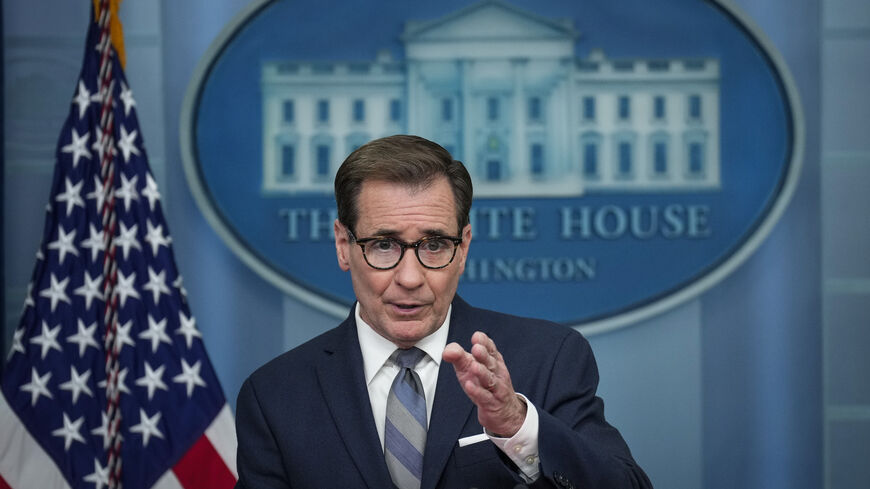WASHINGTON — The United States is preparing additional sanctions to inhibit Iran's transfer of drones and other advanced weapons to Russia for use in Ukraine, a senior White House official said Monday.
"Interactions between Iran and Russia in matters regarding the selling of advanced weapons — especially more advanced UAVs — are now continuing," White House national security spokesperson John Kirby told reporters.
"If Iran proceeds with selling these additional and more advanced UAVs … there is every reason to believe that Russia will use them to continue its attacks against Ukrainian targets," Kirby said.
The depletion of the Russian military's guided missiles in Ukraine and its inability to source arms from abroad due to Western sanctions has led the Kremlin into what White House officials have labeled an "unprecedented defense partnership" with Iran over the past several months.
Iran has transferred more than 400 armed drones to Russia since August — largely of the Shahed series — most of which Russia has expended while targeting critical infrastructure in Ukraine, Kirby said Monday.
The Biden administration has issued at least eight rounds of sanctions on more than two dozen entities in a bid to clamp down on the weapons transfers since September 2022.
Targets of the US sanctions have included Russia's Wagner mercenary group and members of the Aerospace Forces of Iran's Islamic Revolutionary Guard Corps (IRGC), as well as a transportation firm in the United Arab Emirates.
The Biden administration will impose additional designations against those involved in the trade in the coming days, Kirby told reporters Monday.
Tehran initially denied US accusations that it had provided armed drones to Russia for use in Ukraine. Iranian Foreign Minister Hossein Amir-Abdollahian then acknowledged in November that his country supplied Moscow with a “limited number,” but he said it did so prior to Russia's full-scale invasion of Ukraine in February 2022. Russia denies having deployed Iranian drones in Ukraine despite extensive evidence.
Western components have also been found in Iranian-style drones in Ukraine, leading the Biden administration, the European Union and the UK to issue new export restrictions to prevent Western components from winding up in Iranian drones.
Kirby said Monday that the United States would soon announce "new steps to help governments and business better understand the risks posed by Iran's UAV program and the illicit practices that Iran uses to procure components for it."
In return for its support to Russia's war effort, Iran has sought billions of dollars worth of military equipment from Moscow, Kirby reiterated on Monday, including attack helicopters, radar systems and Yak-130 combat trainer aircraft. In March, Iranian state media said Tehran had finalized a deal to buy Russian-made Su-35 fighter jets.
Iran already possesses the Middle East's largest array of guided missiles and drones, and US officials have warned that infusions of Russian technology into its arsenal would enhance Iran's ability to threaten its neighbors.
"Russia has been offering Iran unprecedented defense cooperation including on missiles, electronics, air defense," Kirby said. "The partnership between Russia and Iran is directly enabling Iran's destabilizing activities in the Middle East, posing a threat not just to Ukraine, of course, but also to Iran's neighbors."
Kirby also noted the United States had "not seen any movement on ballistic missiles," following reports late last year that Russia and Iran had discussed potential transfers of such weapons.
Last week, the US Navy announced it would increase planned patrols with allies in and around the Strait of Hormuz in response to a series of seizures of commercial tanker ships by Iran.
The burgeoning military cooperation between Russia and Iran came after indirect talks to restore both the United States and Iran to the 2015 multinational nuclear deal stalled. A decade-long UN arms embargo on Iran expired in 2020 despite US objections.
The United States says Iran’s shipment of drones to Russia violates the missile restrictions imposed under UN Security Council Resolution 2231, which endorsed the 2015 nuclear accord. Biden administration officials have said efforts to revive the deal collapsed last year after Tehran made last-minute demands that Washington said fell outside the scope of the original nuclear agreement.
Kirby on Monday pushed back on questions as to whether the sanctions on Iran's arms transfers to Russia have been effective in stemming the flow.
"You often don't see immediate reaction to sanctions once they're in place, but over time, that effect can build," Kirby said.
"A good example of that is the export controls we put in place with micro-electronics, and we know that that's had an [effect] on Mr. Putin's ability to build, manufacture and field precision-guided munitions," he added.
"That's one of the reasons why he's reaching out to Iran for more advanced now UAVs because he doesn't have the cruise missile inventory that he once had."









